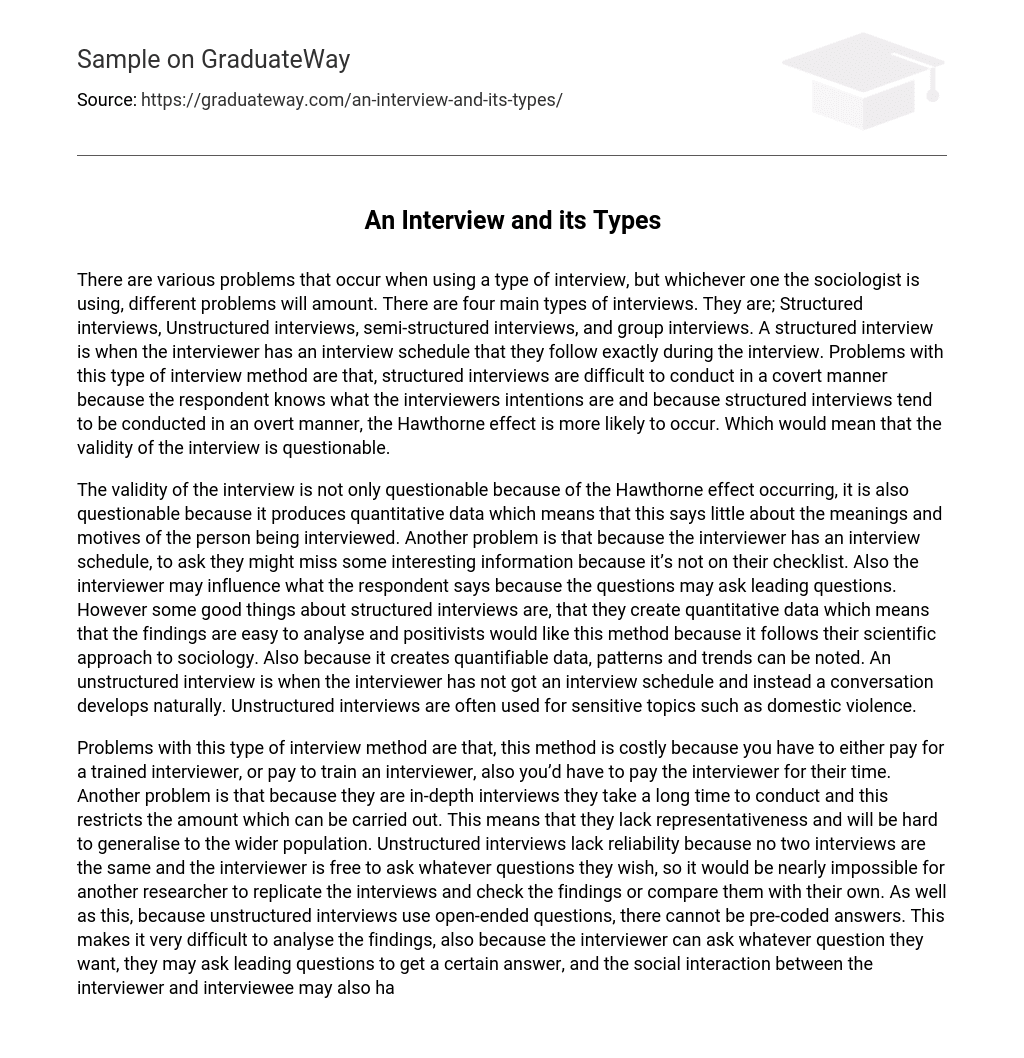Regardless of the type of interview used, various issues can arise. The four main types are structured interviews, unstructured interviews, semi-structured interviews, and group interviews. In a structured interview, the interviewer strictly adheres to an interview schedule. However, this approach has disadvantages. It is challenging to conduct structured interviews covertly because respondents are aware of the interviewer’s intentions. Moreover, since these interviews are usually conducted openly, there is a greater risk of the Hawthorne effect affecting results and questioning the reliability of the interview.
The interview’s validity is questionable due to both the Hawthorne effect and its production of quantitative data, which provides little insight into the interviewee’s meanings and motives. Additionally, the interview schedule may cause the interviewer to overlook interesting information not on their checklist, potentially influencing the respondent’s answers through leading questions. However, structured interviews have benefits such as generating easily analyzable quantitative data that aligns with positivist sociological approaches. This method allows for the observation of patterns and trends. On the other hand, unstructured interviews, characterized by natural conversation without an interview schedule, are commonly used for sensitive topics like domestic violence.
The method of interview utilized presents multiple concerns. One issue pertains to its high cost, which includes expenses for hiring or training an interviewer and compensating their time. Moreover, conducting in-depth interviews consumes a significant amount of time, leading to limitations on the number of interviews feasible and hindering generalizability to a broader population. Additionally, unstructured interviews lack reliability as each one varies and allows the interviewer to ask any desired questions. This aspect makes it extremely challenging for another researcher to replicate or validate the interviews and compare them with their own findings. Furthermore, employing open-ended questions in unstructured interviews poses difficulties in analyzing the data due to the absence of pre-coded answers. The responses obtained may also be influenced by the interviewer through leading questions or establishing a social dynamic that sways the interviewee’s replies. Ultimately, even though rapport can be established during an unstructured interview, both parties are conscious of its purpose, raising doubts about the veracity of the acquired answers.
Unstructured interviews have their validity questioned; however, they offer advantages. They facilitate the establishment of rapport and trust between interviewer and interviewee, leading to greater openness about emotions. Furthermore, as there are no predetermined questions, interviewees can provide detailed answers, enhancing validity chances. Unstructured interviews also excel over structured ones in terms of resolving misunderstandings through explanations or follow-up questions. This approach is favored by interpretivists due to its pursuit of validity, which constitutes their primary objective. Another form of interviewing involves sociologists conducting group interviews instead of one-on-one sessions.
This text examines the strengths and issues connected with group interviews. A significant problem is that specific participants may monopolize the conversation, hindering others from participating. Moreover, peer pressure within the group can influence individuals’ responses as they may seek to impress their friends. As a result, data gathered from group interviews may lack validity and honesty. Another drawback is that group interviews are not reliable because obtaining consistent answers is challenging due to their unstructured format, making replication difficult. Additionally, analyzing data derived from group interviews can be intricate and demanding. Despite these disadvantages, there are some advantages associated with group interviews.
The presence of others in a group setting during interviews can make participants feel more comfortable, resulting in increased openness with the interviewer. Group discussions also allow for the exchange of ideas, leading to more comprehensive and thoughtful data. Moreover, researchers can utilize a combination of questioning and observation of group dynamics and norms. This approach is in line with the objectives of Interpretivists, who prioritize validity in their sociological research.
A Semi-structured interview combines elements from both structured and unstructured interviews by using a consistent set of questions while allowing room for the interviewer to gather additional information. Sociologists view Semi-structured interviews as advantageous because they incorporate benefits from both types of interviews. However, there are drawbacks associated with their use.
While it is impossible to guarantee the honesty of interviewees, analyzing open-ended questions not on the schedule can be challenging. Deviating from the schedule reduces reliability, making it difficult to compare responses from different interviews. Nonetheless, unstructured interviews gather extensive information using open-ended and closed questions, making them relatively reliable and easy to analyze due to pre-coded questions. Therefore, both Positivists and Interpretivists value unstructured interviews for their ability to accommodate various sociological research perspectives. In conclusion, each interview type has its drawbacks, with unstructured interviews being the most problematic and structured interviews being the least problematic. However, semi-structured interviews are often preferred as they allow for collecting qualitative and quantitative data.





